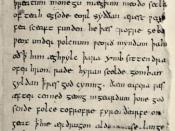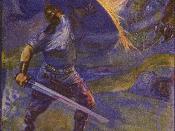Beowulf was written in a time when Christianity was a newly budding religion in England.
Throughout the book there are obvious references to both Christian and Pagan rituals. The
characters in the epic are newly found Christians who are trying to remain true to their new faith
but are weak and hence, in times of great trouble, they resort back to their Pagan traditions and
gods out of fear. Pagan rituals in the book are usually present only as reflections of the past or in
times of the characters's greatest turmoil. Otherwise, in times of happiness and rejoicing, they
worship their one, almighty, Christian God.
When Grendel is attacking Herot, and it's people think they are in their greatest danger,
the people of Herot 'sacrificed to the old stone gods / Made heathen vows / hoping for Hell's
Support, the Devil's guidance in driving their affliction off.' (175-178). With the use of the word
'old' in this section, it can be inferred that the stone gods are things of the past.
The rest of the
passage shows that it was because of the doubt and fear, instilled in the people by Grendel, that
the people of Herot regressed back to their old gods. The use of the word 'heathen' shows that
the soldiers were already Christian and reverted back to their old ways.
Soon after this statement, the poem reads:
Beware, those who are thrust into danger,
Clutched at by trouble, yet can carry no solace
In their hearts, cannot hope to be better! Hail
To those who will rise to God, drop off
Their dead bodies and seek our Father's peace!
This says that the people whose fear consumes them to the point that they lose faith that,
after death, their souls will not be granted eternal peace by...


